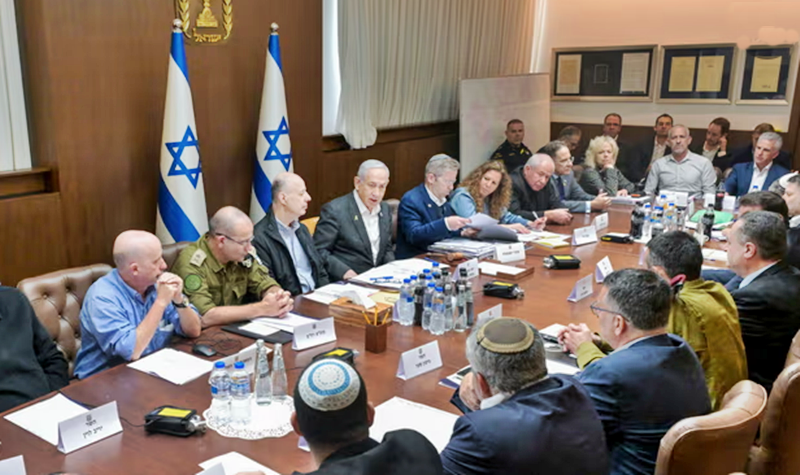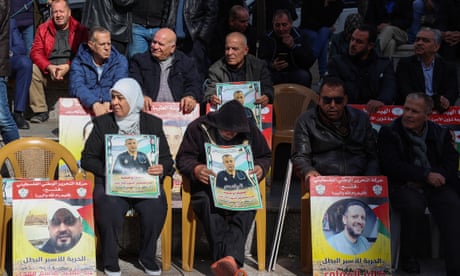Israel security cabinet approves Gaza ceasefire agreement

By Guardian-Lorenzo Tondo/Bethan McKernan-Fri 17 Jan 2025
Ratification comes after delay led to fears that deal would come unstuck. It now passes to full cabinet for signoff.
Israel’s security cabinet has ratified a ceasefire deal to exchange dozens of hostages held by Hamas for Palestinians in Israeli jails and pause the 15-month war for an initial six weeks.
The approval came after an unexpected delay which sparked fears that last-minute disagreements between Israel and Hamas could scuttle the agreement. Far-right members of the Israeli prime minister, Benjamin Netanyahu’s coalition government also threatened to derail months of work to end the conflict.
The deal will now go to the full cabinet for the final signoff so that the agreement can be implemented on Sunday with the release of the first hostages and prisoners.
The Israeli high court is still scheduled to hear petitions against elements of the agreement, but it is widely expected not to intervene.
Under the first phase of the deal, which is to last 42 days, Hamas has agreed to release 33 hostages including children, women – including female soldiers – and those aged over 50. In exchange, Israel would release 50 Palestinian prisoners for every female Israeli soldier released by Hamas, and 30 for other female hostages.
Israel has stated that the names of the hostages would only be made public after they had been handed over to the IDF. A list containing the names of those who will be released over the next six weeks has been circulating on the main Israeli news sites since the early hours of Friday morning.
The French president, Emmanuel Macron, has said that the French-Israeli citizens Ofer Kalderon and Ohad Yahalomi are in the first group of hostages to be freed.
According to a copy of the agreement seen by the Guardian, nine ill and wounded Israelis will be released in exchange for 110 Palestinians serving life sentences in Israeli jails. Men over 50 on the list of 33 hostages will be released in return for prisoners serving life sentences at a ratio of 1:3, and 1:27 for other sentences.
Avera Mengistu and Hisham al-Sayed, two mentally ill Israeli men who entered Gaza a decade ago and have been held hostage by Hamas ever since, will be released in exchange for 30 prisoners. Another 47 prisoners rearrested after being freed as part of a 2011 deal that brought home the Israeli soldier Gilad Shalit from Gaza will also be released.
The deal will also allow in the first phase Palestinians displaced from their homes to be allowed to move freely around the Gaza Strip, which Israel has cut into two halves with a military corridor. Wounded people are supposed to be evacuated for treatment abroad, and aid to the territory should increase to 600 trucks a day, above the 500 minimum that aid agencies say is needed to contain Gaza’s devastating humanitarian crisis.
In the second phase, the remaining living hostages would be sent back and a corresponding ratio of Palestinian prisoners would be freed, and Israel would completely withdraw from the territory. The specifics are subject to further negotiations, which are due to start 16 days into the first phase.

The third phase would address the exchange of bodies of deceased hostages and Hamas members, and a reconstruction plan for Gaza would be launched. Arrangements for future governance of the strip remain hazy. The Biden administration and much of the international community have advocated for the semi-autonomous West Bank-based Palestinian Authority, which lost control of Gaza to Hamas in a brief civil war in 2007, to return to the strip. Israel, however, has repeatedly rejected the suggestion.
Israeli warplanes kept up intense strikes in Gaza until Thursday night. Palestinian authorities said that at least 86 people had been killed in the day after the truce was announced. The Israel Defense Forces (IDF) said late on Thursday that they had attacked approximately 50 targets throughout the Gaza Strip in 24 hours.
More than 15 months of war has killed more than 46,000 Palestinians and laid waste most of Gaza’s infrastructure. The international court of justice is studying claims that Israel has committed genocide.
About 1,200 people in Israel were killed and another 250 taken hostage in the Hamas attack of 7 October 2023 that triggered the war. One hundred of the hostages were freed in exchange for 240 women and children held in Israeli jails, as the result of a ceasefire deal struck in November 2023 that collapsed after a week.
